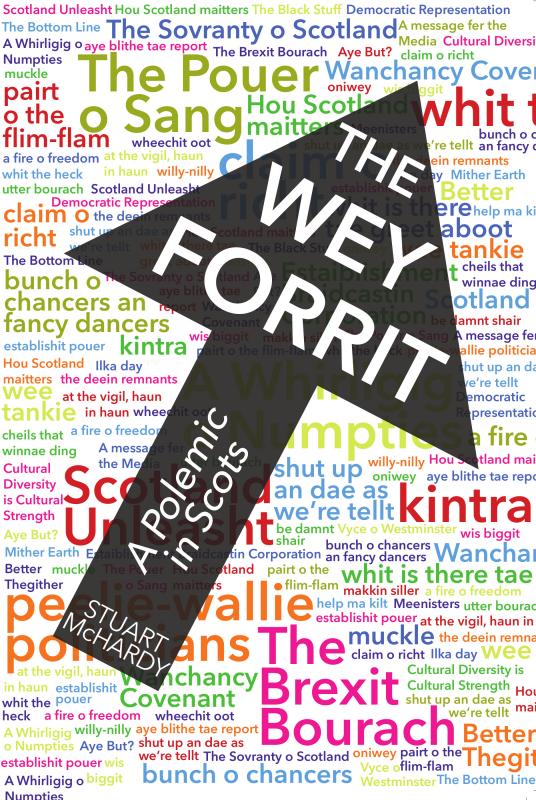Warning: Undefined array key "ssba_bar_buttons" in /usr/home/movgwifi/public_html/yesedinburghwest.info/wp-content/plugins/simple-share-buttons-adder/php/class-buttons.php on line 602
Warning: Undefined array key "ssba_bar_buttons" in /usr/home/movgwifi/public_html/yesedinburghwest.info/wp-content/plugins/simple-share-buttons-adder/php/class-buttons.php on line 602
Warning: Undefined array key "ssba_bar_buttons" in /usr/home/movgwifi/public_html/yesedinburghwest.info/wp-content/plugins/simple-share-buttons-adder/php/class-buttons.php on line 602
 Buy the book here. Caitlin Logan interview in Commonspace.
Buy the book here. Caitlin Logan interview in Commonspace.
The Wey Forrit, written entirely in Scots, looks to the present British political system – branding the UK government a “whirligig o numpties” – and puts forward McHardy’s vision for an independent Scotland and how to get there. “Jock Tamson’s bairns are a clever and complex lot, and I wanted to reflect that.” “We have to understand who we are, how this has been historically distorted, and start standing up for ourselves and taking pride. We have to resist the bourgeois state of Britain trying to tell us who we are and how we are.” “The Wey Forrit is my blueprint for an independent Scotland”.
“Our idea of history is far too limited – we need to broaden it out from political history to cultural history”.
“Stories, art, drama, dance, archaeology…all of these are extremely significant.”
Scottish history and culture has been “misrepresented, suppressed and distorted.”
“Scotland has been run like a colony since 1608.”
The choice to write The Wey Forrit in Scots was important to the goal of shifting this trend, as McHardy had long been bothered by the “suppression of indigenous language” in Scotland. “This has been a deliberate policy of British governments for many years”, he said, and one which he believes has held Scotland back. It’s important to “speak in the voice of the people”
McHardy pointed to the benefits to pupil attainment and self confidence of teaching Scots in schools, which has become more common in recent years. “The more of this that happens, the better”.
“We should be deciding what needs to be done, then arguing about it, no arguing first.” and to engage more than politicians in the process of creating Scotland’s future.
“The whole notion of political change can’t be left to political parties because they have their own agendas”.
“Part of my thesis is that the problem is that all parties are modelled on the Westminster model”.
“Take as an example the utter farce of Prime Minister’s Question Time and First Minister’s Questions. It’s all about debate and an adolescent, public school way of doing things.”
“We should be deciding what needs to be done, then arguing about it, no arguing first”.
The nature of the current political system, which McHardy describes as “psychopathically intolerant”, has led to a backlash of extremism.
“Economic exploitation is at the back of it”. He pointed to the hypocrisy of the UK government in criticising other regimes, meanwhile “going about trying to loot everybody else”.
Scotland is well placed to make a real change now, amidst an unstable political landscape.
He recalled a series of democracy trails he took part in during the lead up to the referendum, when people all over the world expressed their admiration for Scotland’s peaceful independence campaign.
“They saw the way the community of Scotland was proceeding as a model for how the planet should work”.
This counters the common misperception that Scotland is “too wee, too poor, too stupid”.
Stuart McHardy meticulously pulls apart the long-standing political ideas and traditions which many citizens of the UK have automatically accepted as correct or justified. He challenges his readers to re-think the consensus. Focusing on some of today’s most highly discussed and potentially divisive topics – such as Brexit and Scottish Independence – McHardy lambasts the ‘peelie-wallie politicians and lickspittle journalists’ who protect the needs of the rich and sneer at those outside the realms of money and power.
The most important lesson McHardy has learned in researching and writing Scotland’s Future Culture and The Wey Forrit is that: “We’re no better than anybody else but we sure as hell aren’t any bloody worse.”
Yes Edinburgh West has a website, Facebook, Twitter, National Yes Registry and a Library of topics on Scottish Politics, including Independence



